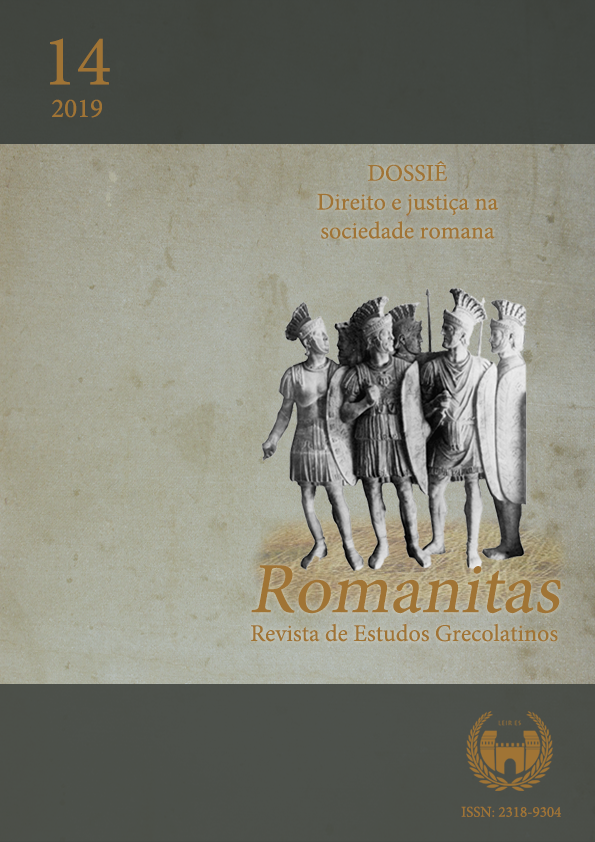Limites e contradições do sistema jurídico romano: Libânio e a censura ao 'consularis Syriae' Tisameno (séc. IV)
DOI:
https://doi.org/10.17648/rom.v0i14.28894Palavras-chave:
Antiguidade Tardia, Governador, Libânio, Justiça, TisamenoResumo
No final do século III, devido às reformas administrativas implementadas por Diocleciano, ocorre a ampla conversão dos governadores de província em juízes de primeira instância, a ponto de a expressão iudex ordinarius – ou simplesmente iudex – se tornar sinônimo de governador. Desse modo, muito mais do que no passado, o governador de província será chamado a lidar com uma quantidade crescente de demandas judiciais, o que o coloca em permanente evidência. Nosso objetivo, no presente artigo, é investigar as acusações levantadas por Libânio contra o consularis Syriae Tisameno que, segundo o autor, não estaria desempenhando com eficiência suas funções de juiz, deixando desassistida uma ampla parcela da população. Por intermédio dos escritos de Libânio, é possível captar o grau de expectativa dos provinciais acerca dos governadores nomeados por Roma, com destaque para a sua atuação como juízes, num contexto em que a aguda polarização social tornava os pauperis vítimas dos potentes.
Downloads
Referências
Documentação textual
LIBANIUS. To the emperor, on the prisoners (Or. XLV). In: _______. Selected orations. Edited and translated by A. F. Norman. Cambridge: Harvard University Press, 1969, p. 161-193. v. II.
LIBANIUS. To the emperor Theodosius against Tisamenus (Or. XXXIII). In: _______. Selected orations. Edited and translated by A. F. Norman. Cambridge: Harvard University Press, 1969, p. 194-233. v. II.
PHARR, C.; DAVIDSON, T. S. (Ed.). The Theodosian Code and novels, and Sirmondian Constitutions. Princeton: Princeton University Press, 1952.
Obras de apoio
BRAVO, G. Historia de la Roma antigua. Madrid: Alianza, 2001.
BRYEN, A. Z. Judging Empire: courts and culture in Rome’s Eastern provinces. Law and History, v. 30, n. 3, p. 771-811, 2012.
BURTON, G. P. Proconsuls, assizes and the administration of justice under the Empire. The Journal of Roman Studiees, v. 65, p. 92-106, 1975.
CARRIÉ, J. M.; ROUSSELLE, A. L’Empire Romaine en mutation: des Sevères à Constantin (192-337). Paris: Seuil, 1999.
CZAIJOWSKY, K. Law, status and agency in the Roman provinces. Past and Present, n. 241, p. 1-29, 2018.
DRINKWATER, J. Maximinus to Diocletian and the ‘crisis’. In: BOWMAN, A. K.; GARNSEY, P.; CAMERON, A. (Ed.). The Cambridge Ancient History. Cambridge: Cambridge University Press, 2008, p. 28-66. v. XII.
ENGEL, J. M.; PALANQUE, J. R. O Império Romano. São Paulo: Atlas, 1978.
GARNSEY, P. The criminal jurisdiction of governors. The Journal of Roman Studies, v. 58, p. 1-1, p. 51-59, 1968.
GONZÁLEZ GÁLVEZ, A. Introducción. In: LIBANIO. Discursos II. Introducción, traducción y notas de Ángel González Gálvez. Madrid: Gredos, 2001, p. 257-261.
HARRIES, J. Law & Empire in Late Antiquity. Cambridge: Cambridge University Press, 1999.
JONES, A. H. M. The Later Roman Empire (284-602). Oxford: Basil Blackwell, 1964. v. I.
KELLY, C. Corruption. In: HORNBLOWER, S.; SPAWFORTH, A.; EIDINOW, E. (Ed.). The Oxford Classical Dictionary. Oxford: Oxford University Press, 2012, p. 386.
LAVAN, L. The political topography of the Late Antique city: activity spaces in practice. In: LAVAN, L.; BOWDEN, W. (Ed.). Theory and practice in Late Antiquity. Leiden: Brill, 2003, p. 314-337.
LIMA NETO, B. M. Entre a filosofia e a magia: o caso da estigmatização de Apuleio na África romana (século II d.C.). Curitiba: Prismas, 2016.
LINTOTT, A. Crime and punishment. In: JOHNSTON, D. (Ed.). The Cambridge Companion to Roman Law. Cambridge: Cambridge University Press, 2015, p. 301-331.
LO CASCIO, E. The new state of Diocletian and Constantine: from the Tetrarchy to the reunification of the Empire. In: BOWMAN, A. K.; GARNSEY, P.; CAMERON, A. (Ed.). The Cambridge Ancient History. Cambridge: Cambridge University Press, 2008, p. 170-183. v. XII.
NORMAN, A. F. Introduction. In: LIBANIUS. Selected orations. Edited and translated by A. F. Norman. Cambridge: Harvard University Press, 1969, p. 155-159.
OLSON, M. Philosophies of imprisonment in Late Antiquity. Constructing the past, v. 9, i. 1, p. 30-46, 2018.
RICHARDSON, J. Roman Law in the provinces. In: JOHNSTON, D. (Ed.). The Cambridge Companion to Roman Law. Cambridge: Cambridge University Press, 2015, p. 45-58.
RIEMSCHNEIDER, K. K. Prison and punishment in Early Anatoly. Journal of the Economic and Social History of the Orient, v. 20, n. 1, p. 114-126, 1977.
ROUECHÉ, C. The functions of the governor in Late Antiquity: some observations. Antiquité Tardive, n. 6, p. 31-36, 1998.
ROUECHÉ, C. Acclamations in the Later Roman Empire: new evidence from Aphrodisias. The Journal of Roman Studies, v. 74, p. 181-199, 1984.
SANTALUCÍA, B. Diritto e processo penale nell’antica Roma. Milano: Giuffré, 1998.
SIRKS, A. J. B. Public Law. In: JOHNSTON, D. (Ed.). The Cambridge Companion to Roman Law. Cambridge: Cambridge University Press, 2015, p. 332-352.
SILVA, G. V.; MENDES, N. M. Diocleciano e Constantino: a construção do Dominato. In: SILVA, G. V.; MENDES, N. M. (Org.). Repensando o Império Romano. Rio de Janeiro: Mauad, 2006, p. 193-221.
SLOOTJES, D. The governor and his subjects in the Later Roman Empire. Leiden: Brill, 2006.
WATSON, L. Invective. In: HORNBLOWER, S.; SPAWFORTH, A.; EIDINOW, E. (Ed.). The Oxford Classical Dictionary. Oxford: Oxford University Press, 2012, p. 740.
WATSON, T. W. The rhetoric of corruption in Late Antiquity. 2010. Dissertation (Doctor of Philosophy in Classics) – University of California, Riverside, 2010.
Downloads
Publicado
Edição
Seção
Licença

Este trabalho está licenciado sob uma licença Creative Commons Attribution-NonCommercial-NoDerivatives 4.0 International License.
a. Os autores mantêm os direitos autorais e concedem à revista o direito de primeira publicação.
b. Os autores têm autorização para assumir contratos adicionais separadamente, para distribuição não-exclusiva da versão do trabalho publicada nesta revista (ex.: publicar em repositório institucional ou como capítulo de livro), com reconhecimento de autoria e publicação inicial nesta revista.
c. Autores têm permissão e são estimulados a publicar e distribuir seu trabalho online (ex.: em repositórios institucionais ou na sua página pessoal) após a primeira publicação pela revista, com os devidos créditos.
d. Os textos da revista estão licenciados com uma Licença CC BY 4.0 Deed Atribuição 4.0 Internacional (CC BY).

























